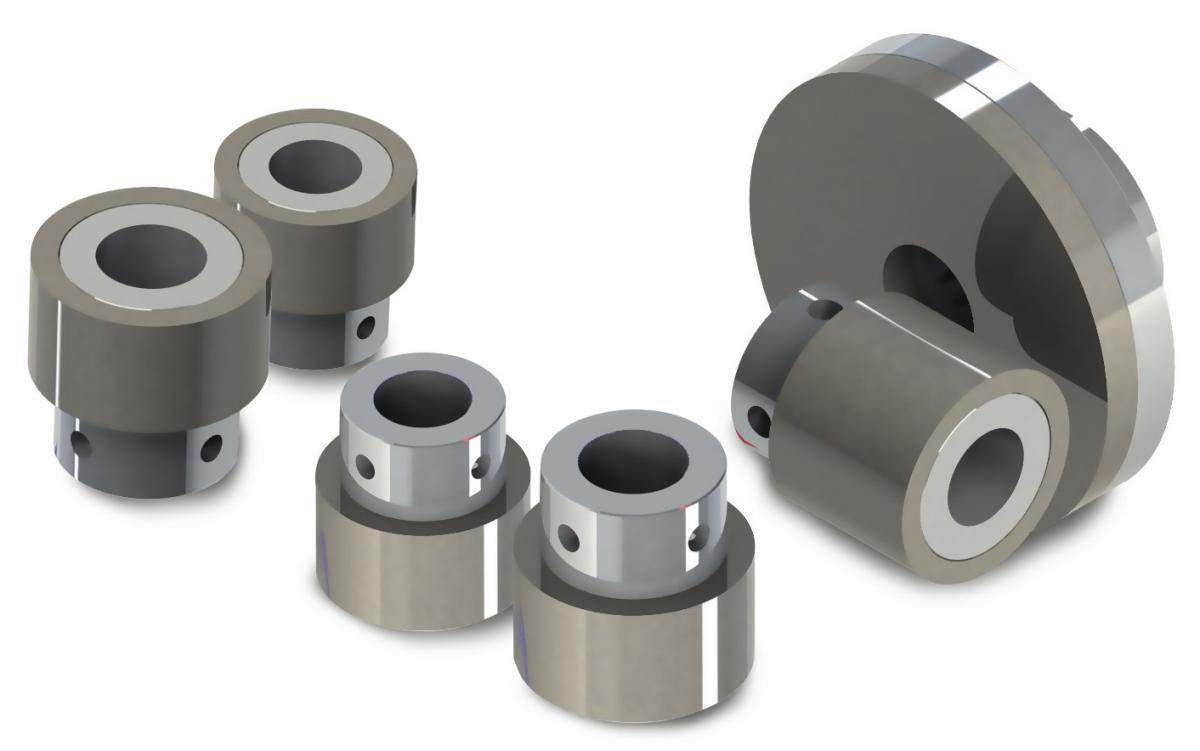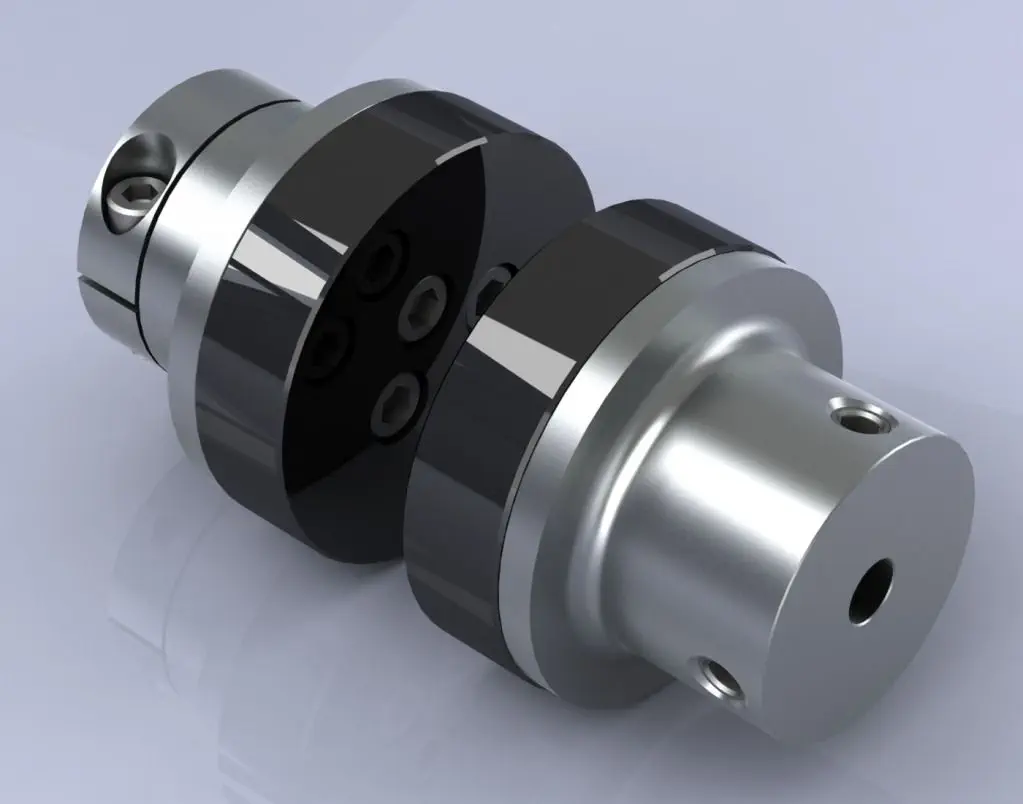Product Description
Made in China custom Magnetic Coupling with High Quality
Introducing our custom Magnetic Coupling, proudly made in China with the highest quality standards. This coupling is designed to provide exceptional performance and reliability, making it an ideal choice for various applications.
Our Magnetic Coupling is crafted using rare earth magnets, ensuring a strong and durable connection. It offers a secure and efficient transfer of power between shafts, eliminating the need for physical contact. This feature not only reduces wear and tear but also minimizes the risk of contamination, making it suitable for sensitive environments.
Ordinary magnetic coupling, working temperature less than 80 ºC, without acid or alkali corrosion environment. Please contact customer service for customization.
| NO. | ФA | ФB | C | ФD | Фa | Фb | Фd | E | F | H | J | K | L | M | P | S | T | V | Фh | Фx | torqueN.m |
| YCL045 | 45 | 38 | 50 | 19 | 33 | 27 | 12 | 32 | 6 | 38 | 5 | 4 | 60 | 4 | 3 | 2 | 5 | 39 | 31 | 65 | 2 |
| YCL060 | 60 | 47 | 58 | 24 | 43 | 35 | 15 | 38 | 8 | 46 | 6 | 5 | 70 | 5 | 4 | 2 | 6 | 48 | 40 | 90 | 6 |
| YCL080 | 80 | 58 | 65 | 28 | 58 | 48 | 20 | 40 | 8 | 50 | 7 | 6 | 80 | 6 | 5 | 4 | 8 | 51 | 55 | 115 | 12 |
| YCL100 | 100 | 70 | 100 | 35 | 72 | 58 | 25 | 72 | 10 | 83 | 8.5 | 7 | 117 | 8 | 6 | 6 | 10 | 84 | 68 | 142 | 45 |
| YCL120 | 120 | 70 | 105 | 35 | 86 | 70 | 30 | 72 | 10 | 86 | 8.5 | 7 | 125 | 8 | 8 | 8 | 10 | 88 | 82 | 165 | 84 |
/* January 22, 2571 19:08:37 */!function(){function s(e,r){var a,o={};try{e&&e.split(“,”).forEach(function(e,t){e&&(a=e.match(/(.*?):(.*)$/))&&1

Maintenance Requirements for Magnetic Couplings to Ensure Long-Term Performance
Magnetic couplings are designed to be low-maintenance compared to traditional mechanical couplings. However, some maintenance practices can help ensure their long-term performance and reliability. Here are the key maintenance requirements for magnetic couplings:
- Regular Inspection:
Perform regular visual inspections of the magnetic coupling to check for signs of wear, damage, or misalignment. Look for any unusual noises or vibrations during operation, which may indicate a potential issue that requires attention.
- Cleanliness:
Keep the magnetic coupling and surrounding area clean and free from dirt, debris, or contaminants. Foreign particles on the coupling’s surface can affect its magnetic performance and lead to energy losses.
- Lubrication:
Magnetic couplings do not require traditional lubrication since they operate without physical contact. However, some couplings may have bearings or other components that require lubrication. Refer to the manufacturer’s guidelines for specific lubrication requirements.
- Environmental Considerations:
Ensure that the operating environment of the magnetic coupling is within the specified limits provided by the manufacturer. Extreme temperatures, aggressive chemicals, or other harsh conditions can affect the performance and longevity of the coupling.
- Alignment Check:
Periodically check the alignment of the driving and driven shafts. Although magnetic couplings can tolerate some misalignment, ensuring proper alignment will optimize efficiency and reduce stress on the coupling components.
- Torque and Speed Limits:
Adhere to the specified torque and speed limits for the magnetic coupling based on the application requirements. Operating the coupling beyond its rated capacity can lead to premature failure.
- Overload Protection:
If the application involves occasional overloads, consider incorporating overload protection features, such as torque limiters or slip mechanisms, to prevent damage to the coupling and connected equipment.
- Regular Maintenance Schedule:
Establish a regular maintenance schedule based on the manufacturer’s recommendations. Periodic inspections, cleaning, and other maintenance tasks can help identify and address potential issues before they escalate.
- Expert Support:
When in doubt or if encountering any significant issues, seek assistance from the magnetic coupling manufacturer or a qualified engineer. They can provide guidance on maintenance best practices and address any specific concerns related to the coupling’s performance.
By following these maintenance requirements, you can ensure the long-term performance, reliability, and efficiency of the magnetic coupling in your application.

Where Can I Find Reputable Suppliers or Manufacturers of Magnetic Couplings for Specific Engineering Needs?
When searching for reputable suppliers or manufacturers of magnetic couplings, it is essential to consider several factors to meet your specific engineering needs. Here are some valuable resources and steps to help you find reliable suppliers:
- Online Directories:
Online directories, such as ThomasNet, Alibaba, and GlobalSpec, are valuable platforms to search for manufacturers and suppliers of magnetic couplings. These directories provide detailed information about companies, their products, and their capabilities, making it easier to identify potential suppliers.
- Trade Shows and Conferences:
Attending trade shows and engineering conferences related to your industry can be an excellent way to meet and connect with magnetic coupling manufacturers in person. These events provide an opportunity to see product demonstrations, discuss your specific needs, and establish direct contacts with suppliers.
- Industry Associations:
Industry associations and organizations often have a network of members, including suppliers and manufacturers of various engineering components. They may provide valuable recommendations and insights on reputable suppliers of magnetic couplings within your industry.
- Referrals and Recommendations:
Seeking referrals from colleagues or industry professionals who have experience with magnetic couplings can be valuable. Recommendations from trusted sources can save time and help you find reliable suppliers.
- Online Research:
Performing online research and reading customer reviews and testimonials can give you insights into the reputation and reliability of different magnetic coupling suppliers. Look for manufacturers with positive feedback and a track record of delivering quality products.
- Supplier Websites:
Visit the websites of potential magnetic coupling suppliers to learn more about their products, services, and manufacturing capabilities. Look for suppliers with a comprehensive product range, engineering expertise, and a commitment to meeting specific customer requirements.
- Customization Options:
Consider suppliers who offer customization options to meet your specific engineering needs. Magnetic couplings may need to be tailored for particular torque, speed, or environmental requirements, so selecting a manufacturer with the ability to create bespoke solutions is essential.
It is crucial to establish clear communication with potential suppliers, sharing your engineering specifications and expectations. Requesting samples or prototypes, if possible, can also help evaluate the suitability of the magnetic couplings for your specific applications. Ultimately, choosing a reputable and experienced supplier will ensure that you receive high-quality magnetic couplings that meet your engineering needs and contribute to the success of your projects.

How Magnetic Couplings Prevent Leakage and Offer a Hermetically Sealed Solution in Industrial Processes
Magnetic couplings provide a hermetically sealed solution in industrial processes by utilizing their unique non-contact power transmission principle. This design allows them to prevent leakage effectively and maintain a reliable, sealed environment. Here’s how magnetic couplings achieve this:
- Non-Contact Power Transmission:
Magnetic couplings operate without any physical connection between the driving and driven shafts. Instead, they use a magnetic field to transmit torque from one rotor to another. The absence of direct contact between components eliminates the need for shaft seals that are common in traditional mechanical couplings.
- Containment Shell:
Magnetic couplings consist of two rotors—an outer rotor connected to the driving shaft and an inner rotor connected to the driven shaft. These rotors are separated by a containment shell made of non-magnetic material with high magnetic permeability. The containment shell encloses the magnetic fields and acts as a barrier to prevent fluid leakage.
- Hermetic Sealing:
The containment shell provides hermetic sealing between the input and output shafts. As the magnetic fields pass through the containment shell, it effectively seals the coupling, creating a barrier that isolates the fluid being handled in the pump or agitator from the external environment. This hermetic sealing prevents fluid leakage, even when dealing with hazardous or corrosive fluids.
- No Dynamic Seals:
In mechanical couplings, dynamic seals are used to prevent fluid leakage at the point where the shaft exits the casing. These seals are prone to wear, aging, and failure over time, leading to potential leaks. Magnetic couplings eliminate the need for dynamic seals, reducing the risk of fluid leakage and improving the overall reliability of the system.
- High Torque Transmission:
Magnetic couplings are designed to handle high torque transmission, making them suitable for a wide range of industrial processes. The strength of the magnetic field and the proper choice of materials ensure that the coupling remains effective and leak-free even under challenging operating conditions.
Due to their hermetically sealed design, magnetic couplings are commonly used in industries where fluid leakage could lead to product contamination, environmental hazards, or safety risks. These industries include chemical processing, pharmaceuticals, food and beverage, and other applications where a sealed and leak-free environment is critical.


editor by CX 2024-04-24